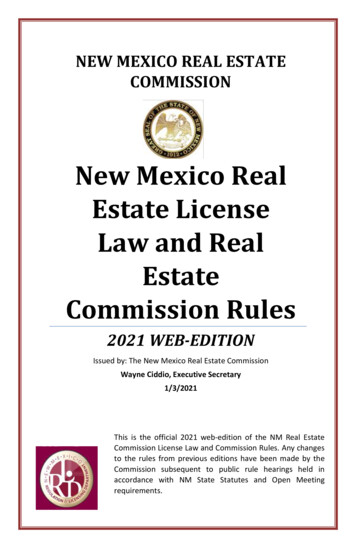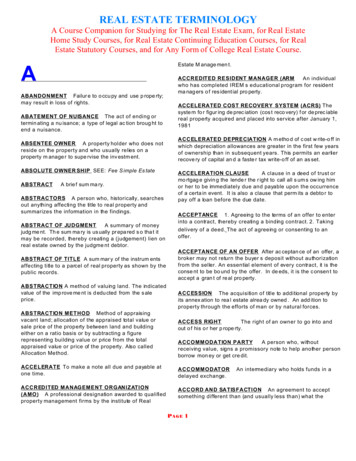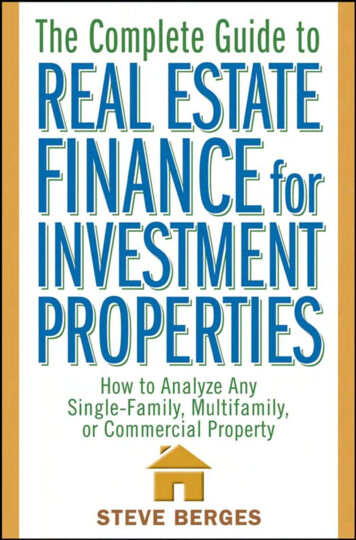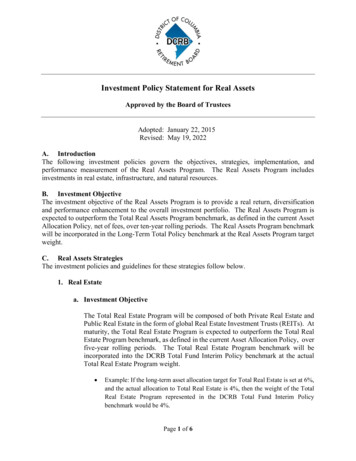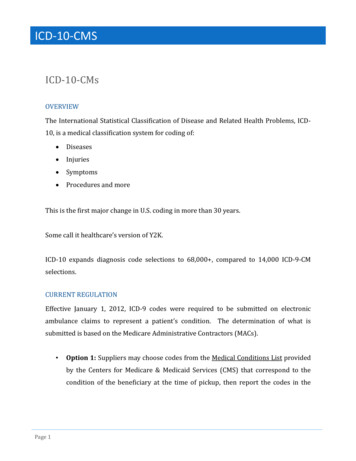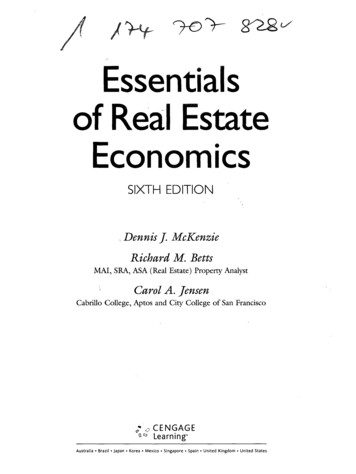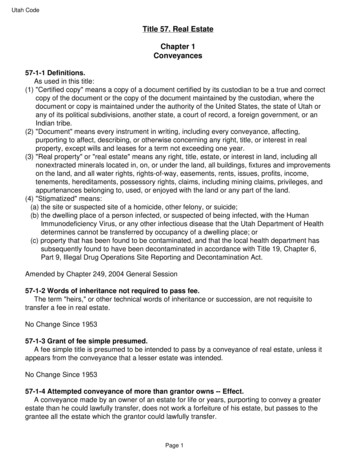
Transcription
Utah CodeTitle 57. Real EstateChapter 1Conveyances57-1-1 Definitions.As used in this title:(1) "Certified copy" means a copy of a document certified by its custodian to be a true and correctcopy of the document or the copy of the document maintained by the custodian, where thedocument or copy is maintained under the authority of the United States, the state of Utah orany of its political subdivisions, another state, a court of record, a foreign government, or anIndian tribe.(2) "Document" means every instrument in writing, including every conveyance, affecting,purporting to affect, describing, or otherwise concerning any right, title, or interest in realproperty, except wills and leases for a term not exceeding one year.(3) "Real property" or "real estate" means any right, title, estate, or interest in land, including allnonextracted minerals located in, on, or under the land, all buildings, fixtures and improvementson the land, and all water rights, rights-of-way, easements, rents, issues, profits, income,tenements, hereditaments, possessory rights, claims, including mining claims, privileges, andappurtenances belonging to, used, or enjoyed with the land or any part of the land.(4) "Stigmatized" means:(a) the site or suspected site of a homicide, other felony, or suicide;(b) the dwelling place of a person infected, or suspected of being infected, with the HumanImmunodeficiency Virus, or any other infectious disease that the Utah Department of Healthdetermines cannot be transferred by occupancy of a dwelling place; or(c) property that has been found to be contaminated, and that the local health department hassubsequently found to have been decontaminated in accordance with Title 19, Chapter 6,Part 9, Illegal Drug Operations Site Reporting and Decontamination Act.Amended by Chapter 249, 2004 General Session57-1-2 Words of inheritance not required to pass fee.The term "heirs," or other technical words of inheritance or succession, are not requisite totransfer a fee in real estate.No Change Since 195357-1-3 Grant of fee simple presumed.A fee simple title is presumed to be intended to pass by a conveyance of real estate, unless itappears from the conveyance that a lesser estate was intended.No Change Since 195357-1-4 Attempted conveyance of more than grantor owns -- Effect.A conveyance made by an owner of an estate for life or years, purporting to convey a greaterestate than he could lawfully transfer, does not work a forfeiture of his estate, but passes to thegrantee all the estate which the grantor could lawfully transfer.Page 1
Utah CodeNo Change Since 195357-1-5 Creation of joint tenancy presumed -- Tenancy in common -- Severance of jointtenancy -- Tenants by the entirety -- Tenants holding as community property.(1)(a)(i)(A) Beginning on May 5, 1997 and ending on May 3, 2022, an ownership interest in realestate granted to two persons in their own right who are designated as husband andwife in the granting documents is presumed to be a joint tenancy interest with rightsof survivorship, unless severed, converted, or expressly declared in the grant to beotherwise.(B) Beginning on May 4, 2022, an ownership interest in real estate granted to two personsin their own right who are designated as spouses in the granting documents is presumedto be a joint tenancy interest with rights of survivorship, unless severed, converted, orexpressly declared in the grant to be otherwise.(ii) Except as provided in Subsection (1)(a)(iii), joint tenancy may be established between twoor more people.(iii) Joint tenancy may not be established between a person and an entity or organization,including:(A) a corporation;(B) a trustee of a trust; or(C) a partnership.(iv) Joint tenancy may not be established between an entity or organization and another entityor organization.(b) An ownership interest in real estate that does not qualify for the joint tenancy presumptionas provided in Subsection (1)(a) is presumed to be a tenancy in common interest unlessexpressly declared in the grant to be otherwise.(2)(a) Use of words "joint tenancy" or "with rights of survivorship" or "and to the survivor of them" orwords of similar import means a joint tenancy.(b)(i) Use of words "tenancy in common" or "with no rights of survivorship" or "undivided interest"or words of similar import declare a tenancy in common.(ii) Use of words "and/or" in the context of an ownership interest declare a tenancy in commonunless accompanied by joint tenancy language described in Subsection (2)(a), whichcreates a joint tenancy.(3) A person who owns real property creates a joint tenancy in himself or herself and another orothers:(a) by making a transfer to himself or herself and another or others as joint tenants by use of thewords as provided in Subsection (2)(a); or(b) by conveying to another person or persons an interest in land in which an interest is retainedby the grantor and by declaring the creation of a joint tenancy by use of the words as providedin Subsection (2)(a).(4) In all cases, the interest of joint tenants shall be equal and undivided.(5)Page 2
Utah Code(a) Except as provided in Subsection (5)(b), if a joint tenant makes a bona fide conveyance of thejoint tenant's interest in property held in joint tenancy to himself or herself or another, the jointtenancy is severed and converted into a tenancy in common.(b) If there is more than one joint tenant remaining after a joint tenant severs a joint tenancyunder Subsection (5)(a), the remaining joint tenants continue to hold their interest in jointtenancy.(6) The amendments to this section in Laws of Utah 1997, Chapter 124, have no retrospectiveoperation and shall govern instruments executed and recorded on or after May 5, 1997.(7) Tenants by the entirety are considered to be joint tenants.(8) Tenants holding title as community property are considered to be joint tenants.Amended by Chapter 344, 2022 General Session57-1-5.1 Termination of an interest in real estate -- Affidavit.(1)(a) Joint tenancy, tenancy by the entirety, or life estate interest in real estate terminates upon thedeath of a tenant holding the interest.(b) The termination of an interest upon death as described in Subsection (1)(a) may be disclosedby an affidavit that:(i) cites the terminated interest that is being disclosed;(ii) contains a legal description of the real property that is affected;(iii) references the entry number and the book and page of the instrument creating theterminated interest;(iv) has attached as an exhibit, a copy of the death certificate or other document issued by agovernment agency as described in Section 75-1-107; and(v) is recorded in the office of the recorder of the county in which the affected property islocated.(2) A determinable or conditional interest in real estate may be terminated by an affidavit that:(a) cites the interest that is being terminated;(b) contains a legal description of the real property that is affected;(c) references the entry number and the book and page of the instrument creating the interest tobe terminated; and(d) is recorded in the office of the recorder of the county in which the affected property is located.(3) An affidavit described under this section may be in substantially the following form:"AffidavitState of Utah)) ssCounty of )I, (name of affiant), being of legal age and being first duly sworn, depose and state asfollows:(The name of the deceased person), the decedent in the attached certificate of death orother document witnessing death is the same person as (the name of the deceased person)named as a party in the document dated (date of document) as entry in book, page in the records of the (name of county) County Recorder.This affidavit is given to terminate of record the decedent's interest in the followingdescribed property located in County, State of Utah: (description of theproperty).Dated this day of , .Page 3
Utah Code(Signature of affiant)Subscribed to and sworn before me this day of , .Notary public".Amended by Chapter 349, 2022 General Session57-1-10 After-acquired title passes.(1) If any person conveys any real estate by conveyance purporting to convey the real estate in feesimple absolute, and at the time of the conveyance the person does not have the legal estate inthe real estate, but afterwards acquires the legal estate:(a) the legal estate subsequently acquired immediately passes to the grantee, the grantee'sheirs, successors, or assigns; and(b) the conveyance is as valid as if the legal estate had been in the grantor at the time of theconveyance.(2) Subsection (1) does not apply to a conveyance by quitclaim deed.Amended by Chapter 287, 2007 General Session57-1-11 Claimant out of possession may convey.Any person claiming title to any real estate may, notwithstanding there may be an adversepossession thereof, sell and convey his interest therein in the same manner and with the sameeffect as if he were in the actual possession thereof.No Change Since 195357-1-12 Form of warranty deed -- Effect.(1) Conveyances of land may be substantially in the following form:WARRANTY DEED(here insert name), grantor, of (insert place of residence), hereby conveysand warrants to (insert name), grantee, of (insert place of residence), for the sumof dollars, the following described tract of land in County, Utah, to wit: (heredescribe the premises).Witness the hand of said grantor this (month\day\year).(2) A warranty deed when executed as required by law shall have the effect of a conveyance in feesimple to the grantee, the grantee's heirs, and assigns:(a) of the premises named in the warranty deed;(b) of all the appurtenances, rights, and privileges belonging to the premises named in thewarranty deed; and(c) with covenants from the grantor, the grantor's heirs, and personal representatives, that:(i) the grantor lawfully owns fee simple title to and has the right to immediate possession of thepremises;(ii) the grantor has good right to convey the premises;(iii) the grantor guarantees the grantee, the grantee's heirs, and assigns in the quiet possessionof the premises;(iv) the premises are free from all encumbrances; andPage 4
Utah Code(v) the grantor, the grantor's heirs, and personal representatives will forever warrant and defendthe title of the premises in the grantee, the grantee's heirs, and assigns against all lawfulclaims whatsoever.(3) Any exception to the covenants described in Subsection (2)(c) may be briefly inserted in thewarranty deed following the description of the land.Amended by Chapter 55, 2007 General Session57-1-12.5 Form of special warranty deed -- Effect.(1) Conveyances of land may be substantially in the following form:SPECIAL WARRANTY DEED(here insert name), grantor, of (insert place of residence), hereby conveysand warrants against all who claim by, through, or under the grantor to (insert name),grantee, of (insert place of residence), for the sum of dollars, the following describedtract of land in County, Utah, to wit: (here describe the property).Witness the hand of said grantor this (month\day\year).(2) A special warranty deed when executed as required by law shall have the effect of:(a) a conveyance in fee simple to the grantee, the grantee's heirs, and assigns, of the propertynamed in the special warranty deed, together with all the appurtenances, rights, andprivileges belonging to the property; and(b) a covenant from the grantor, the grantor's heirs, and personal representatives, that:(i) the granted property is free from all encumbrances made by that grantor; and(ii) the grantor, the grantor's heirs, and personal representatives will forever warrant and defendthe title of the property in the grantee, the grantee's heirs, and assigns against any lawfulclaim and demand of the grantor and any person claiming or to claim by, through, or underthe grantor.(3) Any exceptions to a covenant described in Subsection (2)(b) may be briefly inserted in the deedfollowing the description of the land.Enacted by Chapter 213, 2005 General Session57-1-13 Form of quitclaim deed -- Effect.(1) A conveyance of land may also be substantially in the following form:"QUITCLAIM DEED(here insert name), grantor, of (insert place of residence), hereby quitclaimsto (insert name), grantee, of (here insert place of residence), for the sum ofdollars, the following described tract of land in County, Utah, to wit: (here describethe premises).Witness the hand of said grantor this (month\day\year).A quitclaim deed when executed as required by law shall have the effect of a conveyanceof all right, title, interest, and estate of the grantor in and to the premises therein described andall rights, privileges, and appurtenances thereunto belonging, at the date of the conveyance."(2) A boundary line agreement operating as a quitclaim deed shall meet the requirementsdescribed in Section 10-9a-524 or 17-27a-523, as applicable.Amended by Chapter 385, 2021 General Session57-1-14 Form of mortgage -- Effect.Page 5
Utah CodeA mortgage of land may be substantially in the following form:MORTGAGE(here insert name), mortgagor, of (insert place of residence), hereby mortgagesto (insert name), mortgagee, of (insert place of residence), for the sum ofdollars, the following described tract of land in County, Utah, to wit: (here describe thepremises).This mortgage is given to secure the following indebtedness (here state amount and form ofindebtedness, maturity, rate of interest, by and to whom payable, and where).The mortgagor agrees to pay all taxes and assessments on said premises, and the sum ofdollars attorneys' fee in case of foreclosure.Witness the hand of said mortgagor this (month\day\year).A mortgage when executed as required by law shall have the effect of a conveyance ofthe land therein described, together with all the rights, privileges and appurtenances thereuntobelonging, to the mortgagee, his heirs, assigns, and legal representatives, as security for thepayment of the indebtedness thereon set forth, with covenants from the mortgagor of generalwarranty of title, and that all taxes and assessments levied and assessed upon the land described,during the continuance of the mortgage, will be paid previous to the day appointed for the sale ofsuch lands for taxes; and may be foreclosed as provided by law upon any default being made inany of the conditions thereof as to payment of either principal, interest, taxes, or assessments.Amended by Chapter 75, 2000 General Session57-1-15 Effect of recording assignment of mortgage.The recording of an assignment of a mortgage is not in itself considered notice of theassignment to the mortgagor, his heirs, or personal representatives so as to invalidate anypayment made by them or either of them to the mortgagee.Repealed and Re-enacted by Chapter 155, 1988 General Session57-1-19 Trust deeds -- Definitions of terms.As used in Sections 57-1-20 through 57-1-36:(1) "Beneficiary" means the person named or otherwise designated in a trust deed as the personfor whose benefit a trust deed is given, or his successor in interest.(2) "Trustor" means the person conveying real property by a trust deed as security for theperformance of an obligation.(3) "Trust deed" means a deed executed in conformity with Sections 57-1-20 through 57-1-36 andconveying real property to a trustee in trust to secure the performance of an obligation of thetrustor or other person named in the deed to a beneficiary.(4) "Trustee" means a person to whom title to real property is conveyed by trust deed, or hissuccessor in interest.(5) "Real property" has the same meaning as set forth in Section 57-1-1.(6) "Trust property" means the real property conveyed by the trust deed.Amended by Chapter 155, 1988 General Session57-1-20 Transfers in trust of real property -- Purposes -- Effect.Transfers in trust of real property may be made to secure the performance of an obligationof the trustor or any other person named in the trust deed to a beneficiary. All right, title, interestPage 6
Utah Codeand claim in and to the trust property acquired by the trustor, or the trustor's successors ininterest, subsequent to the execution of the trust deed, shall inure to the trustee as security for theobligation or obligations for which the trust property is conveyed as if acquired before execution ofthe trust deed.Amended by Chapter 236, 2001 General Session57-1-21 Trustees of trust deeds -- Qualifications.(1)(a) The trustee of a trust deed shall be:(i) any individual who is an active member of the Utah State Bar, or any entity in good standingthat is organized to provide licensed professional legal services and employs an activemember of the Utah State Bar, if the individual or entity is able to do business in the stateand maintains an office in the state where the trustor or other interested parties may meetwith the trustee to:(A) request information about what is required to reinstate or payoff the obligation secured bythe trust deed;(B) deliver written communications to the lender as required by both the trust deed and bylaw;(C) deliver funds to reinstate or payoff the loan secured by the trust deed; or(D) deliver funds by a bidder at a foreclosure sale to pay for the purchase of the propertysecured by the trust deed;(ii) any depository institution as defined in Section 7-1-103, or insurance company authorizedto do business and actually doing business in Utah under the laws of Utah or the UnitedStates;(iii) any corporation authorized to conduct a trust business and actually conducting a trustbusiness in Utah under the laws of Utah or the United States;(iv) any title insurance company or agency that:(A) holds a certificate of authority or license under Title 31A, Insurance Code, to conductinsurance business in the state;(B) is actually doing business in the state; and(C) maintains a bona fide office in the state;(v) any agency of the United States government; or(vi) any association or corporation that is licensed, chartered, or regulated by the Farm CreditAdministration or its successor.(b) For purposes of this Subsection (1), a person maintains a bona fide office within the state ifthat person maintains a physical office in the state:(i) that is open to the public;(ii) that is staffed during regular business hours on regular business days; and(iii) at which a trustor of a trust deed may in person:(A) request information regarding a trust deed; or(B) deliver funds, including reinstatement or payoff funds.(c) This Subsection (1) is not applicable to a trustee of a trust deed existing prior to May 14,1963, nor to any agreement that is supplemental to that trust deed.(d) The amendments in Laws of Utah 2002, Chapter 209, to this Subsection (1) apply only to atrustee that is appointed on or after May 6, 2002.Page 7
Utah Code(e) For an entity that acts as a trustee under Subsection (1)(a)(i), only a member attorney of theentity who is currently licensed to practice law in the state may sign documents on behalf ofthe entity in the entity's capacity as trustee.(2) The trustee of a trust deed may not be the beneficiary of the trust deed, unless the beneficiaryis qualified to be a trustee under Subsection (1)(a)(ii), (iii), (v), or (vi).(3) The power of sale conferred by Section 57-1-23 may only be exercised by the trustee of a trustdeed if the trustee is qualified under Subsection (1)(a)(i) or (iv).(4) A trust deed with an unqualified trustee or without a trustee shall be effective to create a lienon the trust property, but the power of sale and other trustee powers under the trust deed maybe exercised only if the beneficiary has appointed a qualified successor trustee under Section57-1-22.Amended by Chapter 465, 2017 General Session57-1-21.5 Trustees of trust deeds -- Duties -- Prohibited conduct -- Penalties.(1) Until a beneficiary under a trust deed or the beneficiary's agent provides a trustee of the trustdeed written instructions directing the trustee to exercise powers under this chapter, the trusteehas no duty or obligation to the beneficiary or to the agent of a beneficiary.(2) Except as provided in Subsection (3), the following duties of a trustee may not be delegated:(a) a preparation and execution of:(i) a notice of default and election to sell;(ii) a cancellation of notice of default and election to sell;(iii) a notice of sale; and(iv) a trustee's deed;(b) the notification of foreclosure through publication, posting, and certified or registered mail;(c) the receiving and responding to requests for reinstatement or payoff requirements; and(d) the handling of reinstatement or payoff funds.(3) Nothing in this section is intended to prevent:(a) a trustee from using clerical or office staff:(i) that is under the trustee's direct and immediate supervision; and(ii) to assist in the duties described in Subsection (2);(b) a trustee from using the services of others for publication, posting, marketing, or advertisingthe sale; or(c) a beneficiary of a trust deed or the servicing agent of the beneficiary from directly performingthe functions described in Subsection (2)(c) or (d).(4) The amendments in Laws of Utah 2002, Chapter 209, to Subsection (3) do not apply to aforeclosure if the notice of default related to the foreclosure was filed before May 6, 2002.(5)(a) Except as provided in Subsection (5)(c), a trustee may not solicit or receive any fee forreferring business to a third party.(b) A fee prohibited under Subsection (5)(a) includes:(i) a commission;(ii) a referral based fee, including a fee for the referral of:(A) title work;(B) posting services; or(C) publishing services; or(iii) a fee similar to a fee described in Subsection (5)(b)(i) or (ii).(c) Subsection (5)(a) does not apply to:Page 8
Utah Code(i) a fee received by a trustee for the trustee acting as co-legal counsel, if the trustee isotherwise permitted by law to receive fees as co-legal counsel; or(ii) a nonpreferred participation in net profits based upon an ownership interest or franchiserelationship that is not otherwise prohibited by law.(6) A trustee may not require the following to pay any costs that exceed the actual costs incurredby the trustee:(a) a trustor reinstating or paying off a loan; or(b) a beneficiary acquiring property through foreclosure.(7)(a) A person that violates Subsection (5) or (6) is guilty of a class B misdemeanor.(b) In addition to a person's liability under Subsection (7)(a), if a person violates Subsection (5) or(6), the person is liable to the trustor for an amount equal to the greater of:(i) the actual damages of the trustor as a result of the violation; or(ii) 1,000.(c) In an action brought under Subsection (7)(b), the party that does not prevail in the action thatis brought under Subsection (7)(b) shall pay the attorney fees of the prevailing party.Amended by Chapter 395, 2013 General Session57-1-22 Successor trustees -- Appointment by beneficiary -- Effect -- Substitution of trustee-- Recording -- Form.(1)(a) The beneficiary may appoint a successor trustee at any time by filing an appointment oftrustee or a substitution of trustee for record in the office of the county recorder of eachcounty in which the trust property or a part of the trust property is located.(b) The trustee appointed under Subsection (1)(a) has the power, duties, authority, and titledescribed in the deed of trust.(c) The beneficiary may, by express provision in the appointment of trustee or substitution oftrustee, ratify and confirm an action taken on the beneficiary's behalf by the new trustee priorto the recording of the substitution of trustee.(2) An appointment of trustee or a substitution of trustee shall:(a) identify the trust deed by stating:(i) the names of the original parties to the trust deed;(ii) the date of recordation; and(iii)(A) the book and page where the trust deed is recorded; or(B) the entry number;(b) include the legal description of the trust property;(c) state the name and address of the new trustee; and(d) be executed and acknowledged by all of the beneficiaries under the trust deed or theirsuccessors in interest.(3)(a) If not previously recorded at the time of recording a notice of default, the successor trusteeshall file for record, in the office of the county recorder of each county in which the trustproperty or some part of it is situated, the appointment of trustee or substitution of trustee.(b) A copy of the appointment of trustee or the substitution of trustee shall be sent in the mannerprovided in Subsection 57-1-26(2) to any:Page 9
Utah Code(i) person who requests a copy of any notice of default or notice of sale under Subsection57-1-26(1)(a); and(ii) person who is a party to the trust deed to whom a copy of a notice of default would berequired to be mailed by Subsection 57-1-26(3).(4) An appointment of trustee or a substitution of trustee shall be in substantially the following form:"Appointment or Substitution of Trustee(name and address of appointed or substituted trustee)is hereby appointed trustee under the trust deed executed by as trustor, inwhich is named beneficiary and as trustee, and filed for record (month\day\year), and recorded in Book , Page , Records of County, (Utah or filed forrecord (month\day\year), with recorder's entry No. , County), Utah.(Insert legal description)Signature(Certificate of Acknowledgment)"(5)(a) A trustee of a trust deed may, in accordance with this Subsection (5), resign as trustee byfiling for record in the office of the recorder of each county in which the trust property islocated, a resignation of trustee.(b) A trustee's resignation under this Subsection (5) takes effect upon the recording of aresignation of trustee.(c) A resignation of trustee shall be in substantially the following form:"Resignation of Trustee( insert name and address of resigned trustee) herebyresigns as trustee under the trust deed executed by (insert name of trustor) as trustor, inwhich (insert name of the beneficiary) is named beneficiary and (insert name of trustee) astrustee, and filed for record (insert the month, day, and year the trust deed was recorded),and recorded in Book , Page , Records of County, Utah or withrecorder's entry no. , County, Utah.(Insert legal description)Signature(Certificate of acknowledgment)"(d)(i) Within three days after the day on which a trustee resigns under this Subsection (5), thetrustee shall provide written notice of the trustee's resignation to each party in any legalaction pending against the trustee that is related to or arises from the trustee's performanceof a duty of a trustee.(ii) Except as provided in Subsection (5)(d)(iv), within 10 days after the day on which a partyis provided a notice described in Subsection (5)(d)(i), the party may move the court tosubstitute the beneficiary of the trust deed as defendant in the action in the place of thetrustee until a successor trustee is appointed.(iii) Except as provided in Subsection (5)(d)(iv), if, after the expiration of the time described inSubsection (5)(d)(ii), a party does not move the court to substitute the beneficiary or thesuccessor trustee in place of the trustee as defendant, the court shall dismiss with prejudiceall claims against the withdrawn trustee.(iv) Subsection (5)(d)(ii) and (5)(d)(iii) do not apply to a cause of action against a trustee thatalleges negligent or intentional misconduct by the withdrawn trustee.(e)Page 10
Utah Code(i) The withdrawal of a trustee of a trust deed under this section does not affect the validity orthe priority of the trust deed.(ii) After a trustee withdraws under this part, only a qualified successor trustee appointed by thebeneficiary under Section 57-1-22 may exercise trustee powers, including the power of sale.Amended by Chapter 305, 2016 General Session57-1-22.1 Effect on trustee of a legal action involving a trust.(1) A party in a legal action that involves a trust deed is not required to join the trustee as a partyin the action unless the legal action pertains to a breach of the trustee's obligations under thischapter or under the trust deed.(2) A trustee of a trust deed is required to act pursuant to a court order against the trust deedbeneficiary to the extent the order requires an action that the trustee is authorized to take underthis chapter or under the trust deed.(3) If a party in a legal action that involves a trust deed joins the trustee in an action that does notpertain to the trustee's obligations under this chapter or under the trust deed, the court shalldismiss the action against the trustee and award the trustee reasonable attorney fees arisingfrom the trustee being joined in the legal action.Enacted by Chapter 305, 2016 General Session57-1-22.5 Notice of assignment of beneficial interest.(1) A recorded notice of assignment of a beneficial interest, executed by the assigning beneficiary,is prima facie evidence of an assignment of the trust deed as described in the notice.(2) The notice of assignment of a beneficial interest shall:(a) state:(i) the names of the original parties to the trust deed;(ii) the date the trust deed was recorded;(iii)(A) the book and page where the trust deed is recorded; or(B) the entry number where the trust deed is recorded;(iv) the legal description of the trust property; and(v) the name and address of the new beneficiary; and(b) be in substantially the following form:Notice of Assignment of Beneficial InterestThe undersigned hereby gives notice that it assigned and transferred all of its rights,title, and interest under the trust deed described below, together with all of the indebtednesssecured thereby, to(insert name and address of current ben
(2) A warranty deed when executed as required by law shall have the effect of a conveyance in fee simple to the grantee, the grantee's heirs, and assigns: (a) of the premises named in the warranty deed; (b) of all the appurtenances, rights, and privileges belonging to the premises named in the warranty deed; and
